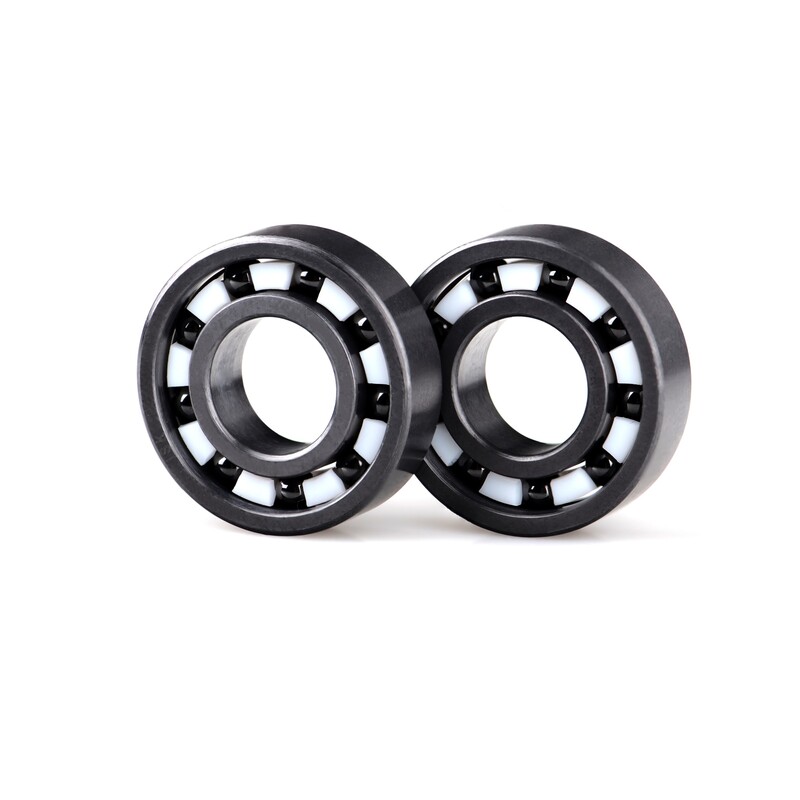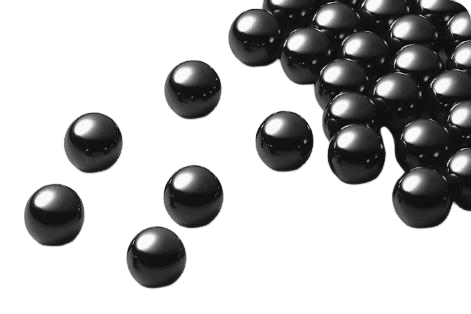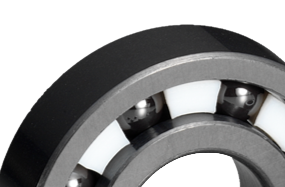Need Support?
Please provide your question. We’ll find you with the best support options.

Ceramic bearings refer to bearings made with ceramic materials for the balls or rollers, typically housed in steel or high-performance plastic outer rings. Common ceramic materials include silicon nitride (Si3N4) and zirconia (ZrO2). These materials are renowned for their exceptional hardness and corrosion resistance.
Lighter Weight: Ceramic balls are about 50% lighter than steel balls, reducing centrifugal force and friction, which significantly enhances performance, especially at high speeds.
Higher Hardness: The hardness of ceramic materials is much greater than that of steel, providing ceramic bearings with superior wear resistance and longevity.
Low Friction and High Efficiency: The smooth surface of ceramic materials results in a low friction coefficient, reducing energy loss. This is particularly important for applications requiring high efficiency, such as racing bicycles and high-performance machinery.
Corrosion Resistance: Ceramic materials are highly resistant to most chemicals and solvents, and they do not rust easily, making them suitable for use in wet or corrosive environments.
Low Thermal Expansion: Ceramic materials have a low coefficient of thermal expansion, which maintains precise tolerances in environments with significant temperature changes, thereby improving mechanical performance.
High Cost: The cost of manufacturing ceramic bearings is significantly higher than that of traditional steel bearings. This means a larger initial investment, particularly in applications that require a large number of bearings.
Brittleness: Although ceramic materials are very hard, they are also more brittle and have lower tolerance for impacts and vibrations. This can be an issue in high-load or unstable environments.
Specific Application Range: Not all applications require the high performance of ceramic bearings. For instance, in low-speed or medium-speed machinery, steel bearings are already sufficiently reliable and cost-effective.
High-Speed Operation Needs: For equipment that operates at high speeds, such as high-speed motors, turbines, and racing bicycles, hybrid ceramic bearings can significantly enhance performance and longevity.
Harsh Environments: In highly corrosive or extreme temperature environments, the resilience of ceramic bearings makes them an ideal choice.
Reduced Maintenance Requirements: If there is a desire to reduce maintenance frequency and costs, the long lifespan and low friction characteristics of ceramic bearings can provide greater economic benefits.
Precision Machinery: In applications requiring high precision and stability, such as medical equipment or high-precision machine tools, the advantages of ceramic bearings are particularly evident.
Ceramic bearings indeed offer a range of significant advantages, including higher hardness, lighter weight, low friction, and high corrosion resistance.
However, their high cost and brittleness also need careful consideration. For certain applications, particularly those requiring high performance, high durability, and operation in harsh environments, the advantages of ceramic bearings can greatly enhance equipment performance and longevity.
In these cases, replacing with ceramic bearings is a worthwhile investment. However, for general-purpose or low-speed applications, steel bearings remain an economical and reliable choice.
In summary, whether it is worth replacing with ceramic bearings should be determined based on specific application needs, economic capacity, and performance requirements.

Ceramic bearings are gaining increasing attention in the cycling world, but whether it is worth replacing existing steel bearings with ceramic ones remains a controversial topic. This article will explore the advantages, disadvantages, and appropriate use cases of ceramic bearings to help cyclists make an informed decision.

The hardness of ceramic balls is three to five times higher than that of steel balls, which means they can better withstand the forces exerted by chain tension and pedaling during use, thereby reducing energy loss. This low rolling resistance helps improve riding efficiency, especially in high-intensity racing environments.

Because the contact between ceramic balls and steel raceways is non-metallic, the risk of corrosion and wear is reduced. Even when contaminants enter the bearing, the wear resistance of ceramic balls remains superior, thereby extending the lifespan of the bearing.

Ceramic bearings are about 50% lighter than steel bearings. Although this weight reduction may not be significant from the perspective of the entire bicycle, it is still attractive to competitive cyclists who strive to reduce every gram of weight.

The value of ceramic bearings depends on the specific needs and cycling goals of the rider. For competitive cyclists or enthusiasts pursuing ultimate performance, ceramic bearings may be an attractive option. They are willing to pay a premium for every incremental performance gain and are willing to perform frequent maintenance.
On the other hand, for most recreational or commuter riders, steel bearings may be more practical and economical. They prioritize durability and low maintenance requirements to ensure the stability and reliability of the bearings under various weather conditions.
 Learn more:Explore Ceramic Bearings: Uncover Their Potential in Your Industry
Learn more:Explore Ceramic Bearings: Uncover Their Potential in Your Industry
Whether to replace bearings with ceramic ones in bicycles depends on individual riding needs, budget, and maintenance capability. For riders who prioritize every performance enhancement and are unconcerned about cost, ceramic bearings indeed offer significant advantages.
However, for a broader range of riders, the high cost and maintenance requirements of ceramic bearings may make them less practical. Before making an upgrade decision, riders should carefully weigh their own riding habits and needs.
Ceramic bearings are specialized bearings where the rolling elements (balls or rollers) and the inner/outer rings are made of ceramic materials such as Zirconia (ZrO2), Silicon Nitride (Si3N4), Hybrid ceramic bearings combine ceramic balls with steel or stainless steel rings
Ceramic bearings feature oil-free self-lubrication (or oil-less lubrication) characteristics, allowing them to operate stably without the need for traditional lubricants
Pros: High hardness, wear resistance, corrosion resistance (acid/alkali resistant), high/low temperature tolerance, lightweight (50% lighter than steel), low friction coefficient, anti-magnetic/electrical insulation, and low thermal expansion,,. Cons: High cost, brittleness (lower tolerance for impact and vibration), lower toughness, and a narrower range of selection
You can visit the ISK official FAQ section to explore answers related to bearing selection, product specifications, and more.
FAQ Section: ISK Bearings FAQ Center
Discover more about the features and applications of various bearings.
Click here to explore more articles and find the perfect bearing for your project.
Needle Bearings (Roller Bearings) are a type of bearing that performs exceptionally well at high speeds. Their rollers are precisely guided by specially shaped, high-rigidity cages with minimal dimensional error. Despite their small cross-section, needle bearings...
How Do Ball Bearings Work? Bearings are often small and unassuming components in a product, yet they are crucial for its proper functioning. Without bearings, many products would fail to operate effectively. But do you know how ball bearings...
Please provide your question. We’ll find you with the best support options.